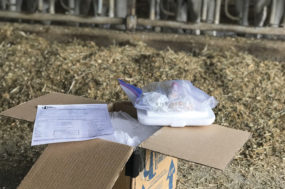Digest Highlights: Whole milk sales limit February fluid decline. Wisconsin Milk Marketing Board changed its name. Leprino and Agropur announce expansion plans. Find a summary of this and other news here.
Stronger whole milk sales limit February fluid decline
February 2018 sales of conventional and organic whole milk rose 2.2 percent and 10.9 percent compared to a year earlier, respectively, again helping limit the decline in overall fluid milk sales.
February 2018 total U.S. packaged fluid milk sales were estimated at 3.7 billion pounds, down 1.6 percent from February 2018, according to the USDA’s Dairy Market News. U.S. sales of conventional products totaled 3.5 billion pounds, down 1.7 percent from the previous year, while sales of organic products, at 205 million pounds, were up 1 percent. Organic represented nearly 5.5 percent of total sales for the month.
Among all categories, only fat-reduced (2 percent) organic milk also posted a gain in February, with low-fat and fat-free conventional and organic varieties the leading decliners.
The U.S. figures represent consumption of fluid milk products in federal milk order marketing areas and California, which account for approximately 92 percent of total fluid milk sales in the U.S. Sales outlets include food stores, convenience stores, warehouse stores and /or wholesale clubs, nonfood stores, schools, the food service industry and home delivery.
Schumer: Don’t forget dairy as NAFTA winds down
With a potential end in North American Free Trade Agreement (NAFTA) negotiations, U.S. Sen. Chuck Schumer (D-New York) called on U.S. trade officials to keep U.S. dairy producers and processors in mind.
Canada, Mexico and the U.S. have been renegotiating the trade agreement since August 2017. U.S. officials have said they hope to have a deal finalized before July’s presidential election in Mexico and U.S. midterm elections in November.
Speaking at the Cayuga Milk Ingredients (CMI) milk plant near Aurelius, New York, Schumer said he sent a letter to United States Trade Representative Robert Lighthizer, urging him to target Canadian dairy pricing policies as talks continue.
Schumer said Canada’s “Class 7” pricing program caused CMI to lose $30 million in annual sales. He said the policy has locked CMI, as well as O-AT-KA Milk and Ideal Dairy Farm, out of Canada’s ultrafiltered milk market. Schumer said the system is likely a violation of Canada’s World Trade Organization (WTO) commitments, a violation that could take years to resolve through the WTO.
Kevin Ellis, CMI chief executive officer, charged creation of Canada’s National Ingredients Strategy was to dump low-cost skim milk products onto the world markets while simultaneously maintaining high tariffs to block imports of dairy products into Canada.
“Securing meaningful and enforceable commitments that will allow U.S. dairy producers to compete with Canada’s on a level playing field should be a top priority in NAFTA renegotiations,” Schumer said in the letter.
Northern New York dairy farmers hit with I-9 audits
About 15 large dairy operations in northern New York have been served with U.S. Immigration and Customs Enforcement (ICE) notices seeking audits of I-9 document information on their employees, according to Bob Gray, with the Northeast Dairy Farmers Cooperatives. The audits are extensive and can take six months to complete.
DFA breaks ground on Utah retail store
Dairy Farmers of America (DFA) broke ground for the construction of a new retail store, The Creamery, in Beaver, Utah. It will replace the existing cheese store currently on the site of DFA’s Beaver City processing plant.
Slated for opening in late 2018, the new 11,250-square-foot store will be more than four times the size of the original cheese store. It will feature expanded retail space, greater product selection and an interactive, educational experience about dairy for visitors. The new location also will feature a full-service café serving breakfast and lunch.
“Our farmers are proud of the dairy products they produce each and every day, and The Creamery will reflect this by bringing the freshness of the farm and the Utah region to life, as all the milk comes from local farms and is processed into cheese just steps away from the store right here in Beaver City,” said Dennis Rodenbaugh, senior vice president and chief operating officer of DFA’s Western Fluid Group. “This will not be your typical convenience stop along the highway. With the use of natural woods and metals, which harken back to the farm, The Creamery will be a dairy destination and perfectly on trend with what consumers today are looking for, which is knowing where their food comes from.”
The Utah Governor’s Office of Economic Development approved a $50,000 fast-track grant to help fund The Creamery.
Pennsylvania Department of Agriculture requests hearings on potential dairy reforms
The Pennsylvania Department of Agriculture (PDA) requested that the Pennsylvania Milk Marketing Board consider solutions to challenges currently faced by the state’s dairy farmers.
Pennsylvania Ag Secretary Russell Redding submitted a formal petition to the board requesting a hearing, or as many hearings as necessary, to find actions the board can take without statutory changes and those that require action by the General Assembly.
“Pennsylvania’s Milk Marketing Law and the Milk Marketing Board have both served our state’s dairy industry well, but there is room for improvement and reforms to meet the needs of today’s producers and milk dealers alike,” said Redding.
Pennsylvania CDE offers ‘PA Preferred’ grants
Pennsylvania’s Center for Dairy Excellence (CDE), in partnership with the Pennsylvania Department of Agriculture Bureau of Market Development, is offering grants to promote and market locally produced dairy products designated as “PA Preferred.” The goal of the program is to leverage partnerships with dairy processors and retailers to bring additional dairy marketing and promotion support.
Up to four $2,500 grants are available for first-time participants. Up to 10 $1,000 grants are available for participants who already received a grant from the CDE. Download an application at the Center for Dairy Excellence website. To learn more about the program, contact Myrannda Kleckner at (717) 346-0849 or by email.
‘Peel Back the Label’ calls out ‘deceptive’ dairy marketing
A National Milk Producers Federation (NMPF) initiative is calling out more dairy companies for what it terms are deceptive labels and marketing.
NMPF’s "Peel Back the Label" campaign added yogurt maker Stonyfield to its roster of companies allegedly using misleading food labeling or deceptive marketing to stoke consumer fear and misconceptions about food to increase sales.
Launched last year, the Peel Back the Label campaign has singled out Stonyfield, Danone-owned Left Field Farms and California-based Clover Sonoma for inclusion of “non-GMO” labels on milk.
“America’s dairy farmers support truth and transparency in food labeling across the food industry, as well as in our own backyard. When companies use meaningless absence-claims labels and deceptive marketing, that’s just wrong. Peel Back the Label will continue to call out bad actors – even in the dairy community – as we see them in an effort to demand responsible marketing for consumers. They deserve better,” said Jim Mulhern, NMPF president and CEO.
Wisconsin Milk Marketing Board becomes ‘Dairy Farmers of Wisconsin’
The Wisconsin Milk Marketing Board has a new name – Dairy Farmers of Wisconsin (DFW).
"The dairy industry is facing several challenges, including globalization of our markets, increased regulation and ongoing low prices for milk," said Jeff Strassburg, board chairman and a fifth generation Wisconsin dairy farmer. "This change will put Wisconsin dairy farmers in a better position to help us grow and stay focused on the future."
The dairy checkoff-funded organization is a nonprofit organization that focuses on marketing and promoting dairy products.
Agropur expanding Michigan plant
Agropur Inc. will invest $21.3 million over the next three years at its processing plant near Grand Rapids, Michigan. The expansion will include modernizing production lines and increasing production capacity.
Most of the expansion project will be for new equipment, with a portion going toward building modifications. The plant currently produces various shelf-stable dairy products and nondairy products such as soy beverages, protein drinks and broths.
The Michigan Business Development Program (MEDC) is supporting the expansion effort with a $434,000 performance-based grant, according to The Right Plac Inc., a western Michigan economic development organization.
Agropur is a Wisconsin-based subsidiary of Agropur Cooperative, a Canadian firm processing more than 13 billion pounds of milk per year at its 39 plants across North America.
Leprino Foods expanding in New Mexico
Leprino Foods Company will invest over $15 million to expand their manufacturing facility in Chaves County, New Mexico. The plant produces mozzarella cheese, whey protein and lactose.
New Mexico will provide up to $200,000 for Leprino’s expansion and the construction of a refrigerated/freezer warehouse.
Leprino Foods is already the largest private sector employer in Chaves County.
Leprino, headquartered in Denver, Colorado, is the largest producer of mozzarella cheese in the world.
DFA Garden City plant honored for sustainability
Dairy Farmers of America’s (DFA) dairy ingredients plant in Garden City, Kansas, received the Sustainable Plant of the Year Award from Food Engineering magazine. The award honors a newly constructed food facility focused on reducing, reusing and recycling.
The plant is a partnership between DFA and 12 of its member farms in southwest Kansas. It produces whole and skim milk powder, nonfat dry milk powder and cream, and receives approximately 4 million pounds of milk a day from regional farms.
From the moment a tanker truck enters the plant, it takes about 68 minutes to off-load the milk, clean the truck and test the milk, drastically reducing hauling and trucking costs, as well as conserves energy and resources.
In addition, all the water utilized at the plant is recycled and can be used by the city as a source of nonpotable water. ![]()

-
Dave Natzke
- Editor
- Progressive Dairyman
- Email Dave Natzke





